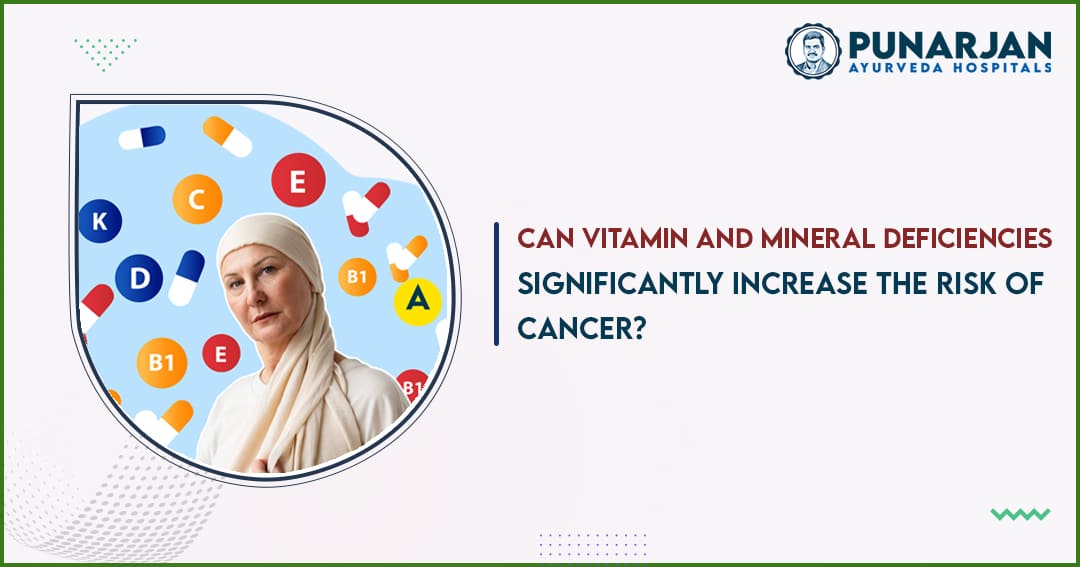
The link between nutrition and health is deeply ingrained, and a growing realization shows that lacking essential vitamins and minerals could spell grave outcomes, such as heightened vulnerability to cancer. Today, we shall explore this subject matter, unearthing the intricate elements that fuel these scarcities, the significance of timely identification, and the landscape of scientific investigation within this realm.
Vitamin and Mineral Deficiencies and Cancer Risk
Vitamins and minerals, pivotal for sustaining prime health, are vital in manifold biological procedures. Cell growth and division, pivotal processes susceptible to disturbance, can potentially instigate cancer. The inadequacy of particular nourishing elements, encompassing vitamins A, C, D, E, several B vitamins, and minerals like zinc and selenium, has been linked to an augmented jeopardy of diverse cancer variants.
Factors Contributing to Vitamin and Mineral Deficiencies
Vitamin and mineral deficiencies can arise from various causes, such as inadequate diet, digestive disorders affecting nutrient absorption, elevated nutrient needs during specific life stages or conditions, interactions between drugs and nutrients, and alcoholism. Tackling these factors can thwart deficiencies and lower the chances of developing cancer.
Early Detection Methods
Non-invasive ways to spot cancer early, like blood tests, are a hopeful field of study. The tests, sometimes known as “liquid biopsies,” identify unique cancer markers in the blood. These markers, which may be DNA, RNA, proteins, or metabolites released by cancer cells, are handy in catching cancer at its earliest stages, possibly before symptoms, leading to better treatment results. Nonetheless, a key hurdle is ensuring these tests are both super-sensitive (spotting cancer when it’s there) and super-specific (dodge false alarms).
Biological Characteristics of Cancers
Unraveling the mysterious nature of cancers holds immense potential in enhancing screening initiatives. Take interval cancers, for instance, lurking amidst routine screenings, stealthily exhibiting divergent traits from their counterparts. These insidious malignancies might exhibit accelerated growth or as elusive cancer variants that elude conventional screening modalities.
Investigating such enigmatic cancers endows researchers with invaluable wisdom to calibrate screening protocols, intercepting their emergence at earlier stages. This may necessitate heightened screening frequencies or pioneering novel techniques that exhibit heightened acuity towards these elusive cancer phenotypes.
Current State of Research
Ongoing investigations unravel the intricate connection between nutrition and cancer, striving to forge potent tactics that stave off and combat cancer via dietary interventions. These pursuits encompass scrutinizing the impact of specific nutrients and holistic dietary patterns on the perils of cancer.
Implications for Future Cancer Research and Ayurvedic Strategies
The implications of the findings in this field carry immense weight for future cancer research and treatment endeavors. They underscore the paramount significance of adopting a comprehensive cancer prevention and treatment methodology, encompassing medical interventions alongside lifestyle adjustments like dietary changes. Regarding Ayurvedic tactics, these findings lend credence to the Ayurvedic belief in utilizing diet as a healing instrument. Consequently, amalgamating Ayurvedic dietary principles with conventional cancer care is possible.
Prevention and Control
Cancer prevention, early detection, and control science encompasses comprehending risk factors, formulating potent screening techniques, and translating such knowledge into public health policies. Consider, for instance, the identification by researchers of lifestyle aspects, including diet, exercise, and tobacco use, that exert substantial influence over cancer risk. By endorsing judicious lifestyle preferences, we can diminish the occurrence of cancer.
Similarly, productive screening techniques can uncover cancer at its most manageable stage. Ultimately, disseminating this scientific knowledge into public health policies is pivotal in advocating cancer prevention and population control.
Valuable Insights
Poor Diet
A study titled “The Transition Health and Urbanization in South Africa (THUSA) study” uncovered an intriguing link between the eating habits of a South African population and people infected with human immunodeficiency virus (HIV). Remarkably, the study unveiled that inadequate dietary patterns, predominantly characterized by consuming processed and fast foods, contribute significantly to the insufficiency of essential vitamins and minerals. Notably, this deficiency disproportionately affects individuals with lower socioeconomic status, who encounter restricted opportunities to obtain nourishing foods of high nutritional value.
Malabsorption
The paper “Gut Microbiota and Malnutrition” explores the intricate connection between malabsorption, primarily triggered by diseases affecting the digestive system, and the insufficiency of essential vitamins and minerals. The indispensable role of the gut microbiota in assimilating nutrients is emphasized, emphasizing that any disturbances in this delicate balance can result in malabsorption and subsequent deficiencies of vital nutrients.
Increased Requirement
According to the study titled “Nutritional demands and human evolution: An energy-focused framework,” specific periods or circumstances in life, such as pregnancy, lactation, and rapid growth in childhood and adolescence, can heighten the body’s need for particular vitamins and minerals. Please fulfill these escalated needs to avoid insufficiencies.
Drug-Nutrient Interactions
The intriguing paper titled “Drug-nutrient interactions: an extensive examination” brings attention to the noteworthy fact that specific medications possess the potential to disrupt the assimilation, utilization, or creation of crucial vitamins and minerals, thereby inducing deficiencies. Consider, for instance, the extended application of proton pump inhibitors, which may result in a deficiency of vitamin B12.
Alcoholism
The study titled “Alcohol and Nutrition” delves into the intricate relationship between chronic alcohol intake and the development of malnutrition and numerous deficiencies in essential vitamins and minerals. Alcohol disrupts the body’s ability to absorb and effectively utilize nutrients while simultaneously heightening the elimination of these vital elements.
Immunoprevention of Cancer: Current Status and Future Prospects
- The idea of immune-based prevention, which entails activating the immune system for cancer prevention, is getting attention from scientists. The method relies on the concept that our body’s defense system can be taught to detect and eradicate tumor cells, preventing any harm.
- Recent progress in this area has caused the formation of tumor vaccines. Such vaccines are created to educate the immune system to spot specific markers on tumor cells. This enables the body’s defense system to aim at and eradicate these specific cells.
- One of the primary obstacles in creating productive malignancy vaccinations is recognizing suitable goals. Tumor cells are well-known due to their capability to undergo mutations and alter their indicators. These can turn them challenging to focus on. Nevertheless, new research has discovered multiple potential objectives as potential targets for cancer vaccines.
- Another challenge is guaranteeing the immune system’s response is powerful enough to remove cancer cells. Nevertheless, it must not have such a high intensity triggering negative consequences. Scientists are investigating different methods to equalize opposing demands. These individuals utilize adjuvants to enhance the body’s immune system and create transportation systems that direct the inoculation to certain body locations.
- Despite these difficulties, immune system prevention has great prospects in decreasing the worldwide impact of cancer. With our knowledge regarding the defense mechanism and the study of cancer expanding, we anticipate witnessing additional breakthroughs in this thrilling area.
Conclusion
A valuable revelation not generally acknowledged is that not all mineral deficiencies can be resolved through diet alone. Nevertheless, additional may have a significant function in dealing with these shortcomings. At times, augmentation could be needed. Moreover, although it’s crucial to maintain sufficient consumption of every essential nutrient, avoiding consuming these necessary compounds in surplus is equally vital. That is owing to overconsumption that could lead to damaging outcomes.
Regarding cancer prevention, Punarjan Ayurveda’s Rasayana approach emphasizes fortifying the body’s innate defenses. By empowering toxin elimination and fostering tissue well-being, it strives to prevent cancerous cell emergence and propagation. Punarjan Ayurveda seeks to purify the body, enhance immunity, and promote holistic well-being through dietary recommendations, lifestyle adjustments, and medicinal herb utilization. This comprehensive approach may eradicate cancer risk at its core, assuring complete eradication.
To sum up, guaranteeing sufficient consumption of important nutrients and support from the best cancer hospital in kerala is essential for preventing cancer.


